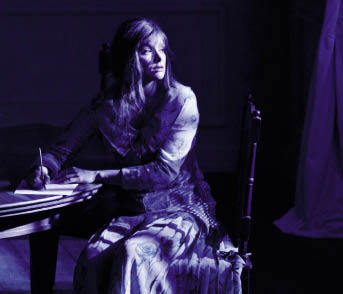Eugene Onegin
Bolshoi, Royal Opera House
La bohème
Soho Theatre, until 4 September
Rule 1 for the sophisticated contemporary opera-goer: complain about the poor diction of singers, especially as compared to 50 years ago, and lay most of the blame on surtitles (actually the connection between the two phenomena is unclear). Rule 2: be astonished at the naïveté of anyone who is bewildered by contradictions between what is said (sung) and what is happening.
To judge from the Bolshoi Opera’s production of Tchaikovsky’s Eugene Onegin, Russian directors are cottoning on to modern trends. The whole thing is set in a vast dining room, with a big table round which the chorus sits. So after the delightfully open-air music with which the opera begins, when Mme Larina says to the guests, ‘Come inside and have some supper,’ they have all been pretending to eat and chatter since curtain-up. During the most exquisite passage in the Letter Scene, Tatiana, frustrated by her indecision, pushes the table and noisily knocks over many of the chairs. The duel takes place — or, rather, fails to — partly on the table, until Onegin and Lensky struggle and the rifle goes off, accidentally killing Lensky, which makes Onegin’s years of remorse and travel incomprehensible. The Gremins live in a very similar setting, but with crimson walls and fancy chairs. The Polonaise isn’t danced; and so on.
What makes this sabotaging of the opera by director and designer Dmitri Tcherniakov so irritating is that the musical side of things is for the most part wonderful. Dmitri Jurowski, brother of the better-known Vladimir, conducts his great orchestra with precision and passion; and the players have retained more than I expected to hear of the traditional Russian sounds, incredibly grainy lower strings, vibrato from the brass. Only the Polonaise was straitjacketed.
The responsibility for bringing Onegin himself to life lies wholly with the performer, since Tchaikovsky was unable to endow his music with character: fortunately, the great young baritone Mariusz Kwiecien is fully up to the task, making one wonder how generations of commentators could complacently describe Onegin as cold, unconcerned, etc. It is his scruples which lead him to decline Tatiana’s plea, and surely a marriage between them would have been a hideous mistake. Kwiecien even instils conviction into the perfunctory music with which Tchaikovsky punishes Onegin in the final scene; one feels more for him than one does for Tatiana. And that despite the acting and singing of Tatiana Monogarova, whose warm voice and lovely presence compensate for old-style overacting, which Tcherniakov has done nothing to eliminate: lots of straining arms, furniture clutching, all round. Alexey Dolgov doubles as Lensky and Monsieur Triquet, which is baffling: one minute in the first ball scene he is camping it up, the next he is raging with unjustified jealousy. Dolgov has a voice in the grand tradition of Lemeshev and Kozlovsky, though he hasn’t their penetration — but perhaps they wouldn’t have if they had had to sing two contrasting roles simultaneously. The veteran Anatoli Kotscherga is a noble Prince Gremin, endowing his aria with something approaching ardour. Other parts are taken by other veterans.
Onegin remains a problematic piece. Musically uneven, and with dramatic and musical high-spots disconcertingly unaligned. Its fundamental flaw is that it seems to be an argument in favour of everyday life, in which marriages work because the partners in them will them to, and have enough interests and duties to keep them busy, if not exactly happy. That is the burden of the opera’s opening ten minutes. But Tchaikovsky is the last composer to make a plausible case out for that. Life, for him, has to be urgent, colourful, emotions always on the verge of getting out of hand until they excitingly really do. Apart from Lensky’s gratuitous death, things turn out very much as one might hope — and, anyway, Gremin won’t last long, and then Tatiana and Onegin can get together and live out the consequences of their delusions.
OperaUpClose’s production of La bohème, which had such a successful run at The Cock Tavern in Kilburn, has transferred to the Soho Theatre. Where before the audience numbered about 40, some on the stage, now it is 150 upwards, and the whole scale is larger and inevitably less intimate. Nonetheless, the production still works extraordinarily well for three of the four acts, and the second half is tremendous. Placing Act II in the bar downstairs is disastrous, though: I could hear almost nothing and see absolutely nothing; bar regulars went on talking as though there was no competition. The text has been made racier, though there are still many annoying misplaced stresses. The piano is played as metronomically as ever; surely after so many performances a hint of rubato could be introduced? I saw Elinor Jane Moran as Mimi, the only member of the cast for whom I can envisage an operatic future. Anthony Flaum, whose acting is superlative, both spontaneous-seeming and subtle, has a voice which should serve him very well in musicals — which is what this Bohème really is. It was great to see so many people in the audience who wouldn’t normally go near an opera house, but if they were lured into thinking they might see something more of this kind there, they would be mistaken.






Comments